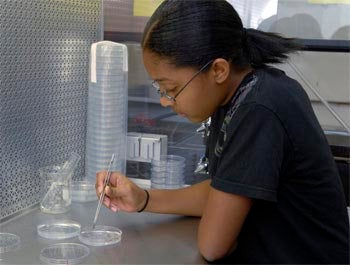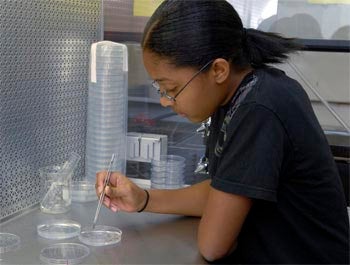 PROVIDENCE, R.I. — January 16, 2009 — How many educational programs train you for a job in the growing biotechnology field after just two semesters and one summer internship?
PROVIDENCE, R.I. — January 16, 2009 — How many educational programs train you for a job in the growing biotechnology field after just two semesters and one summer internship?
The University of Rhode Island’s biotechnology manufacturing program offered at its Feinstein Providence Campus does just that. The program has become so popular that for the first time since it was initiated in 2003, students have been admitted into a new January class this year. While the January class is already full, the program is now accepting applications for September 2009 enrollment.
Prospective students interested in learning more about this exciting program are invited to come to an information session, Jan. 29, Feb. 26, March 19, or April 16 at 6 p.m. in Room 302 at the Providence campus, located at 80 Washington St.
Here’s the deal: In what is called an upside-down curriculum, students spend two semesters in full-time studies taking courses in microbiology, organic and biochemistry, biotechnology, and physiology. After completing a summer internship at a biotechnology company in Rhode Island or nearby Massachusetts, students are awarded a certificate.
Most certificate-bearing students typically find employment in firms such as Amgen, Alexion, Epi Vax, Tedor Pharma, Organogenesis, Myomics, and Abbott Labs and earn salaries ranging from $30,000 to $50,000. A number of students continue to take classes part time at either URI’s Providence or Kingston Campuses to convert that certificate into a bachelor’s of science degree in biotechnology manufacturing. Some, not all, biotechnology firms will even pick up the educational tab.
“While enrollment is open to everyone, including recent high school graduates, this program has attracted students in a wide range of age and educational backgrounds who are eager to train for a new career,” says Ed Bozzi who oversees the program. “Some have been laid off, others are working in jobs where there is little opportunity for advancement while still others are returning to college after raising children or leaving the military. All agree that this is a practical way to turn a long-term interest in biology, medicine, or technology into a challenging and economically-viable career.”
Bozzi says the program’s unique curriculum and state-of-the-art laboratory are critical factors in the program’s success. The laboratory includes more than $1 million of sophisticated equipment, donated by Pfizer, Satorius, and from various state grants.
In addition to attending an information session, people interested in the program can contact Bozzi at 277-5162 or at ebozzi@mail.uri.edu. He can also advise students who might want to take a spring or summer class to prepare for the program. To learn how other continuing education opportunities could fit with your goals visit www.Thinkbiginprov.com. The University is now enrolling for the spring semester, which begins January 21.

